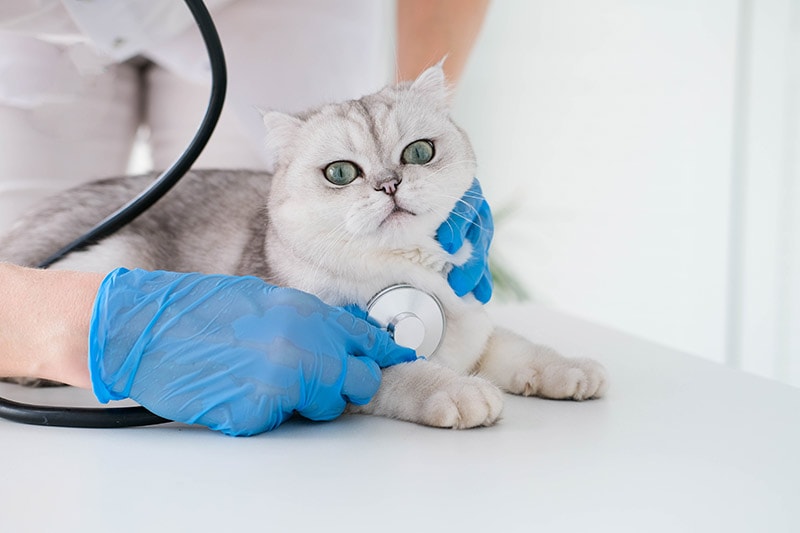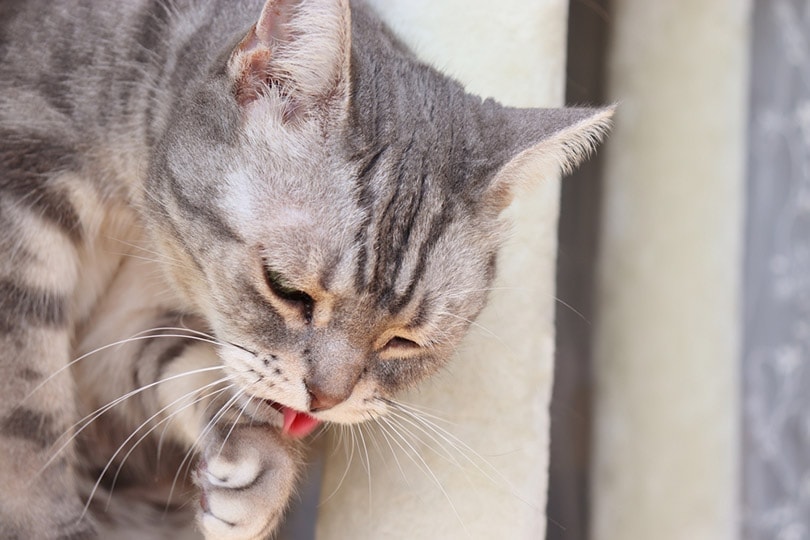Could Your Cat Be Allergic to You? Science-Based Facts & FAQ

Updated on

Pet allergies are common in humans, and many people choose to bring beloved pets into their homes by opting for hypoallergenic breeds or allergy treatments. Plenty of people are allergic to cats, specifically, but what about the other way around? Could your cat be allergic to you?
Though rare, cats can be allergic to their human owners. Like humans, cats can be allergic to common allergens like pollen and dust that come in contact with their skin and trigger an immune response. Find out more about human allergies in cats and what you can do to help.
Treating Allergies in Cats
If you think your cat is allergic to you, it may be caused by an environmental pollutant. The first step is speaking to your veterinarian about its allergies and diagnosing the possible triggers.
Allergy tests can be done with a blood test or skin test. The blood test involves taking a sample of the cat’s blood and evaluating it in the lab. The skin test is more reliable but less pleasant for your pet.
Using a small needle with the allergen, your veterinarian will scratch areas of your cat. This is repeated with all suspected and common allergens, including human dander. After a few days, you can bring your cat back to the veterinarian for an examination of the test sites. Areas that reacted to the allergen will likely be inflamed and irritated, indicating an allergic reaction to that particular trigger. Cats may also develop hives in response to the scratch.

Allergies in Cats
In doing an allergy test on your cat, you might find they are allergic to you and/or a host of other things. Cats can be allergic to food, fleas, seasonal allergens, or allergens in the environment. Here are the types of allergies in cats:
- Environmental allergies: These allergies are caused by substances in the environment, such as pollen, fungi, mold, dust, and grass. Cats may also be allergic to human environmental triggers, such as cigarette smoke, cleaning products, and perfume.
- Flea allergies: Cats can be allergic to the bites caused by fleas. Unfortunately, a flea bite transfers the flea’s saliva, which can cause a widespread immune response instead of a local one.
- Food allergies: Some cats have allergies related to specific foods, such as chicken, beef, or wheat. Though some food allergies can cause skin itchiness, allergies can also show in vomiting and diarrhea.
- Atopic dermatitis: Many allergies in cats show in the skin with a condition called atopic dermatitis. This condition is characterized by scabbing, skin sores, hair loss, and redness.
What Now?
If your cat is allergic to your human dander, and not a fixable environmental cause like cigarette smoke or perfume, you have solutions. Your cat can be treated with the same oral drops or allergy shots as a form of immunotherapy. This treatment exposes your cat to small amounts of the allergens, training its immune system to become more tolerant and less reactive over time.
Your veterinarian may also consider eye and ear drops, topical ointments, cortisone pills, and antihistamines to manage allergies. Be sure to work with your veterinarian on the appropriate treatment and avoid giving your cat any allergy medication intended for human use, even if it’s over the counter.
You can help your cat with its allergies by reducing the triggers in your environment. Cats with allergies are usually allergic to more than one thing, so maintaining a clean environment is vital to treatment.

Here are some tips to reduce the allergens in your home and on your cat:
- Use veterinarian-approved flea and tick control to prevent flea and tick bites.
- Choose dust-free cat litter, which will deposit less dust on your cat as it uses the litter box.
- Bathe your cat as often as possible to relieve itching.
- Keep your home clean by washing fabrics often, vacuuming carpets and furniture, and wiping down hard surfaces.
- Feed your cat high-quality food with plenty of nutritional support. If the veterinarian approves, consider added omega fatty acids for skin and coat health.
- Wash your cat’s bedding regularly and vacuum cat trees and perches.
- Avoid smoking around your cat.
With a little effort and guidance from your veterinarian, you can manage your cat’s allergies and implement lifestyle changes that reduce allergens in your home. This not only benefits your cat, but also benefits the health of yourself and your whole family.
Final Thoughts
Cats can be allergic to a variety of pollutants, including human dander from shed skin cells. More likely, cats are allergic to pollutants in the environment caused by humans, such as soaps, perfumes, cleaning products, and cigarette smoke. In addition, cats may be allergic to environmental allergens like dust or pollen, just like humans. The best way to manage your cat’s allergies is by working with a veterinarian to determine the cause and appropriate treatment.
See Also:
- 10 Best Hypoallergenic Cat Breed: Vet-Reviewed Facts & FAQ
- 11 Best Cat Foods for Allergies (Hypoallergenic Cat Foods) – Reviews & Top Picks
Featured Image Credit: Africa Studio, Shutterstock










